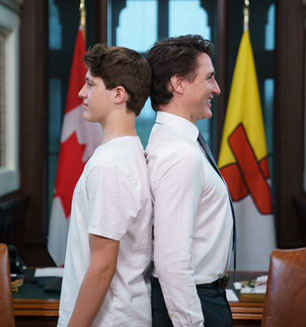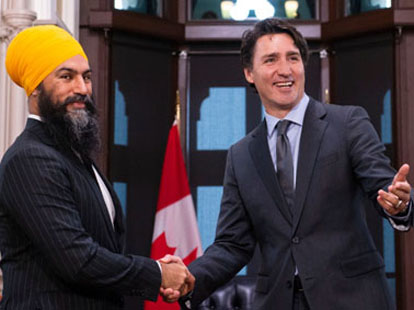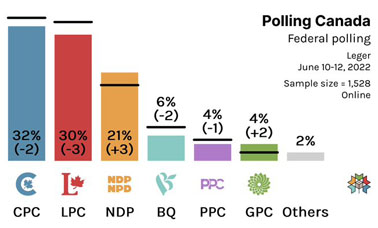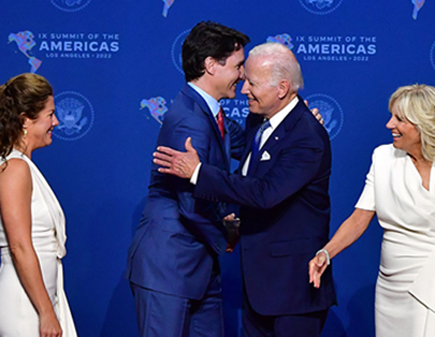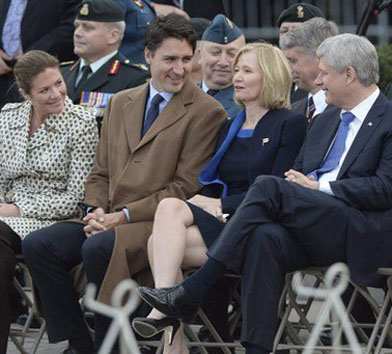Is Justin Trudeau’s problem that Canadian prime ministers do have too much power?
Jun 21st, 2022 | By Counterweights Editors | Category: In BriefCOUNTERWEIGHTS EDITORS, GANATSEKWYAGON, ON. JUNE 21, 2022. If it were just Don Martin on the CTV News site saying “The fall of Justin Trudeau has begun” that would be one thing. But when Chantal Hébert is also asking in the Toronto Star “Is Justin Trudeau headed for defeat?” something at least half-serious could be afoot.
Our own immediate opinions are somewhat closer to Aaron Wherry’s recent piece on the CBC News site : “The Liberals face a summer of discontent … The government has had a productive spring — but there are minefields ahead.”
Whatever else, the current opinion polling does suggest that Justin Trudeau and his federal Liberals have recently fallen somewhat in the people’s esteem. The 338Canada June 19, 2022 update now has the leaderless Conservatives in first place with 33.4% of the Canada-wide popular vote. The Liberals have only 31.6%.
It may be hard not to wonder just how much of this present Liberal polling setback flows from the Trucker Convoy in Ottawa this past winter? And how much draws on current events in the USA next door?
The progressive agenda under attack
At the same time, the as-hard-as-it-gets federal political fact is that the March 22, 2022 “Supply and Confidence Agreement” between the Trudeau Liberals and the Singh New Democrats still seems quite intact. And even on the June 19 338Canada numbers the Liberals and New Democrats together have 51.3% of the cross-Canada popular vote.
As Aaron Wherry’s recent piece wisely concludes : “The most important thing Trudeau did for himself this spring may have been signing that confidence-and-supply agreement with the NDP. It means (at least in theory) that the threat of an election is no longer constant. And it offers his government (again, in theory) some time to ride out the current turbulence, put an agenda in place and make the case that it’s the right agenda for the moment.”
As matters stand some distance from Ottawa, we don’t quite see the need for the “in theory” qualifications here. If the past few months have hurt the federal Liberals in the polls, the New Democrats have prospered. (According to a June 10–12, 2022 Leger poll only the New Democrats and Greens have increased their share of the Canada-wide vote since the September 2021 federal election!) There are no obvious signs that Jagmeet Singh has grown disenchanted with the “Supply and Confidence Agreement.” It appears to be working as planned.
We also feel that the Trudeau government which signed this agreement does have a broadly and clearly progressive agenda for meeting the many growing challenges for everyone in the global village, as they currently appear in Canada. The problem isn’t so much that the government’s current agenda is unclear. It’s that it is increasingly being criticized and even mindlessly attacked by financially potent conservative forces, who dislike this agenda because it is too progressive.
Focusing on PM Trudeau
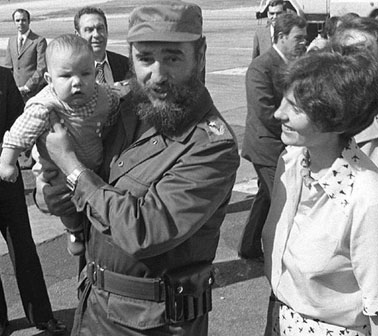
Prime Minister Justin Trudeau himself of course has become an increasing focus for mindless right-wing rhetoric that, at its most “Fuck Trudeau” extreme, claims he is really the son of Fidel Castro. (And “proves” it with photos of his late brother Michel as a baby, on a 1976 trip to Cuba with his mother Margaret and father Pierre Trudeau.)
Don Martin’s recent much more moderate conservative critique does urge that disaffection from PM Trudeau’s current leadership extends to Liberals : “As one prominent and wealthy 40-year Liberal supporter told me: ‘I won’t send them another dime until he’s gone. He’s a wimp.’” (Like what Donald Trump called Mike Pence, on the testimony of close associates?)
Most of the key current criticisms Mr. Martin and others cite, however, come from broadly conservative sources, fundamentally unhappy about Justin Trudeau’s (and Jagmeet Singh’s) success in pursuing a progressive agenda in hard times.
The “ former top bureaucrat Paul Tellier,” who has recently criticized PM Trudeau’s version of the much-attacked over-centralization of recent years in the Prime Minister’s Office, was Conservative PM Brian Mulroney’s Clerk of the Privy Council (and a “former head of both Canadian National Railway and Bombardier Inc.”).
But who can finally beat him?
At the same time again, Chantal Hébert sheds light on Justin Trudeau’s current leadership challenges when she points out that no Canadian prime minister “has succeeded in securing a fourth consecutive electoral victory in more than a century.” And that is exactly what a Justin Trudeau who leads his party into the (“in theory”?) next fixed date Canadian federal election on October 20, 2025 (see March 2022 “Supply and Confidence Agreement”) will be trying to do.
It is similarly true that between and even on the lines Brian Mulroney’s Clerk of the Privy Council and current PMO critic Paul Tellier seems at least as concerned about Stephen Harper’s Federal Accountability Act as about anything done by Justin Trudeau.
This finally points to some possible similarities between the later careers of both Stephen Harper and Justin Trudeau (and in some degree every other Canadian prime minister since Wilfrid Laurier, 1896–1911). And this brings us to the point where we begin to think maybe Canadian prime ministers have come to have a little too much power. Voters gradually come to sense this, and after a while they move away from a prime minister long (enough) in office.
And yet, assuming PM Trudeau II is going to last until 2025, and then lead his party in a bid for a fourth consecutive election victory — in a Liberal tradition of sunny ways (and Western Canadian booming) that goes back to Wilfrid Laurier — who do the Conservatives have who can beat him? And, assuming Donald Trump finally proves a passing aberration with limited impact in the true north, can whoever finally wins the Conservative leadership race on September 10, 2022 really do the job?
